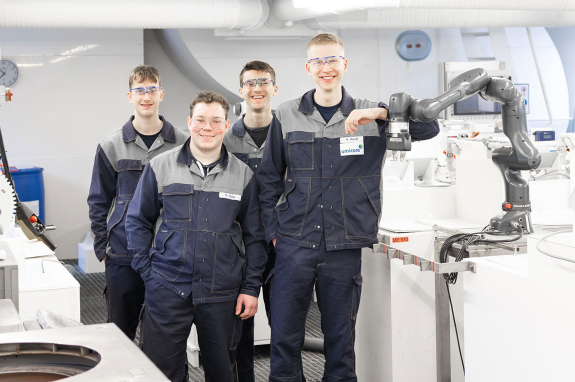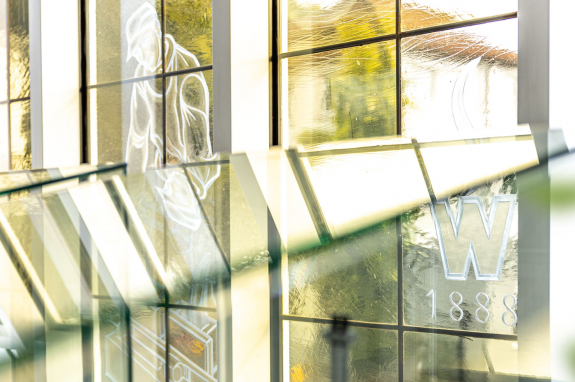FAQs
Of course you still have questions about our training! It's your step into the working world and you want to be sure about the framework of the training. Here we have compiled the questions that we are asked time and again in discussions.
If the answers are not sufficient or if you still have questions - no problem, our HR Manager Steffen Barth is looking forward to hearing from you!
![]()
Where can you find out more about us?
At apprenticeship fairs at the beginning of the year in Aalen and Schwäbisch Gmünd. Here you can meet the people who need to know: our trainers, but above all our current trainees. First-hand information about the apprenticeship, an impression of what makes us tick, the opportunity to register for the taster afternoon, pick up a free gift and have your house key gold-plated - a visit is definitely worthwhile.
On a internship, whether from school or simply during the holidays. You can't get a more direct experience of what and who would expect you at our company. If you are genuinely interested in our company, just get in touch with Steffen Barth, our Head of HR, to discuss it further.
At our annual introductory afternoon in the summer. Here we present our company and give you a first insight into possible future fields of work during a tour. Of course, you can ask all your questions here and also get to know the trainers. Again, if you’re interested, simply reach out to our Head of HR, Steffen Barth.
Our trainees will come to your school and give you an understanding of our company. Just find out from your school whether it offers such a day and when it takes place.
What do we do?
Umicore Electroplating develops and produces electrolytes, preparations and special processes for surface coating. This makes us an indispensable part of the modern world. Whether for smartphones, LED lighting or electric vehicles, our products are used by many well-known companies. But we are not only at home in the technical field, but also in the decorative field. Jewellery in all variations, elegant bathroom fittings or electrical appliance housings are made really chic by our know-how. You can find out more about us on our company website.
What is electroplating?
Electroplating is the coating of surfaces with other metals (for example gold or silver). This layer is usually only wafer-thin and lies in the μm range (a human hair, for example, is up to 50 times thicker than one of our layers).
How do we handle applications?
First of all, we need your application folder. This needs to contain a cover page (ideally featuring your passport photo) with your name and address. Naturally, we also need a classic covering letter in which you introduce yourself and tell us the reasons behind your application. It would be great if you could include a letter of motivation – you should use this to show your personal aptitude and set yourself apart from other applicants. To complete the folder, include your CV and copies of your last three school reports or certificates.
After you’ve sent us your application (either by post or by email), we’ll get back to you straight away. If you’re able to come and see us in person, you’ll be invited to an aptitude test and a face-to-face interview. This test mainly assesses your general knowledge. Then, in the interview that follows, we'll get to know you better by discussing your interests and skills in more detail.
If you make a good first impression, we’ll offer you a position – the last piece of the jigsaw is gaining medical clearance from our company doctor. If you would like to complete a taster internship before making your decision, we’ll be happy to arrange that for you.
What skills or qualifications do you need?
Industrial Clerk: You should have an interest in commercial and organisational tasks, a grasp of foreign languages (primarily English) and should be open and communicative.
Surface Coating Technician: You should have an interest in chemistry, physics and mathematics, and a certain manual dexterity.
Chemical Technician: You should have an interest in chemistry and technology, along with a strong sense of responsibility and manual dexterity.
Chemical Production Specialst: Natural scientific understanding and interest in mathematics, as well as manual skills
Important: Surface Coating Technicians, Chemical Technicians and Chemical Production Specialists must not be allergic to nickel, as they deal with materials containing nickel on a daily basis. Our company doctor will test you for this before the start of your apprenticeship.
Does an internship help you in your decision?
Completing an internship with us is definitely the best way to get to know the trade and our company. On the flip side, we also have the chance to get to know you and your abilities. In short: an internship is a big boost if you’re serious about further training with us at a later date.
How long is an apprenticeship?
For Surface Coating Technicians and Industrial Clerks, the training takes 3 years. Only the Chemical Technician need 3.5 years, Chemical Production Specialists just 2 years. In any case, you can shave six months off an apprenticeship with us if your grades are high enough.
In which departments will you work?
Industrial Clerk: Purchasing, Sales and Marketing, Accounting, Production Office, HR, Administration and Logistics, insights into the production departments and IT
Surface Coating Technician: Production departments, Labs, Research and Wastewater Management
Chemical Technician: Production departments, Analytical Lab, Logistics, Workshop and Wastewater Management
Chemical Production Specialist: Production departments, Logistics, Workshop and Wastewater Manage
What duties will you carry out in your role?
Your duties always depend on the department you’re placed in, but here are a few examples to give you an idea:
Industrial Clerk: Liaise with customers, suppliers and business partners; obtain, negotiate and prepare quotes; process, execute and monitor orders; plan and implement publicity measures, and support financial and administrative accounting
Surface Coating Technician: Coat surfaces with metals – e.g. gold plating using chemical processes; metalwork; work with and handle wastewater, exhaust air, recyclable materials and chemicals in an environmentally-conscious manner; monitor processes, and conduct quality assurance checks
Chemical Technician: Produce high-quality precious metal solutions; measure and regulate production processes; apply process control engineering, process engineering and IT; handle chemicals in an environmentally-conscious manner; conduct product control and quality assurance checks
Chemical Production Specialist: Produce high-quality precious metal solutions; controlling and recording production processes, process and plant engineering, handle chemicals in an environmentally-conscious manner; conduct product control and quality assurance checks
What are your working hours?
Our trainees work 37.5 hours per week (daily working time: 7.5 hours). Our flexitime model allows you to decide for yourself when you want to complete the work. Of course, that’s something for you to agree with other colleagues in your department.
How much will you earn?
In your first year of training: approx. € 1,186/month
In your second year of training: approx. € 1,260/month
In your third year of training: approx. € 1,326/month
How much holiday will you get here?
You’ll have an annual holiday entitlement of 30 days, which you can take as you wish, subject to agreement with your department.
What else do we offer?
A three-day seminar, held at the start of each training year, in which trainees from all three professions in all three years of apprenticeships come together. During this event, you’ll learn new skills in personal development training sessions – but also get to know the other trainees and see a different side to the instructors.
Foreign language courses and training in IT applications.
Daily lunch in our canteen.
A travel cost bursary so that you only have to pay a small part of the cost of your ticket.
Where will the vocational classes be held?
As a Surface Coating Technician or an Industrial Clerk, you’ll go to the vocational college in Schwaebisch Gmuend-Bettringen.
The classes for Chemical Technicians and Chemical Production Specialists are held at the vocational college in Stuttgart-Feuerbach. You’ll have the option of staying in the student halls located close by for the duration of each teaching block.
How often will you have school?
As an Industrial Clerk, you will have one and a half days of vocational school. The rest of the time, you’ll work with us as usual.
As a Surface Coating Technician, Chemical Technician or Chemical Production Specialist you’ll study in teaching blocks – this means you’ll have two to four weeks of full-time classes in a block. In between, you’ll work full-time with us for a few weeks.
What subjects will you study at school?
Industrial Clerk: Business administration, accounting, economics, social studies, German, English
Surface Coating Technician: Technical theory, German, economics, social studies, practical skills, computing theory
Chemical Technician: Theory classes (career-specific), practical classes (career-specific), German, social studies, history, computer engineering
Chemical Production Specialist: Theory classes (career-specific), practical classes (career-specific), German, social studies, history, computer engineering
What is the examination process?
Industrial Clerk: Halfway through your apprenticeship you’ll take an interim test. In the final year of your apprenticeship, you’ll complete final written exams in five subjects. You’ll also complete a project in your area of expertise, as part of which you’ll give a presentation on one of our company’s business processes.
Surface Coating Technician: Halfway through your apprenticeship you’ll take an interim test. The end of your training also involves written exams in each subject. For the practical part, you’ll have to process workpieces, prepare documentation on workpiece processing, conduct laboratory analyses and pass oral interviews with your examiners.
Chemical Technician: There are two examinations during the apprenticeship: the first part is completed after two years, and the second part at the end of the apprenticeship. The subjects of the written exams include methods engineering, metrology and systems engineering, as well as economics and social studies. The practical exams include production and processing operations, process control engineering as well as an inspection or maintenance task.
Chemical Production Specialist: The intermediate exam takes place at the end of the first year of training. The final exam at the end of the second year is divided into a written and practical part.
What are the chances of further training after the apprenticeship?
There is the possibility of further training in all three occupations, and we’ll support you fully if you choose to follow this path.
As an Industrial Clerk, you can continue to train and become a Business Administrator or Business Economist.
As a Surface Coating Technician, further training can help you become a Technical Business Administrator, an Engineer or a Master Electroplater.
As a Chemical Technician, you can train further to become an Engineer, a Master Tradesman or a Technical Business Economist.
As a Chemical Production Specialist you have the possibility to gain a further training as Chemical Technician. In addition, a training as a Technician or Industrial Master is possible.
Do you already have your Abitur (German school-leaving qualification)? If so, you’re welcome to study after completing your apprenticeship. If not, don’t worry – many courses will still admit you if you’ve passed Master or Business Administrator examinations.
![]()

Zu dieser Seite passende Websiteinhalte



